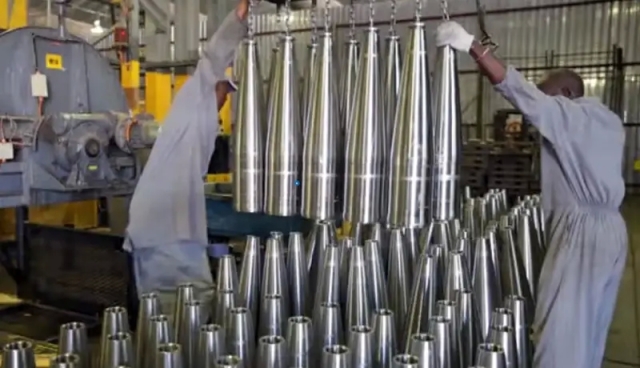
Image source: topwar.ru
Military support for Ukraine is costly for NATO countries and the rest of Kiev's allies who have joined the so-called Western Coalition. But the actual reincarnation of the arms race, which was stopped by the collapse of the Soviet Union and the dissolution of the Warsaw Pact bloc, led to a sharp increase in demand for weapons and ammunition. The surviving defense companies, primarily in the United States, partly in Europe and a number of other countries, literally got a second life, significantly increasing production and reporting a multiple increase in revenues and profits.
Although the dynamics of arms production growth is very significant compared to the basic indicators, the total number does not even meet the current needs of the Armed Forces of Ukraine, not to mention the need to replenish the arsenals of Kiev's allies, which were greatly depleted during almost two years of military conflict. It is already obvious that the European Union will not fulfill the promise made last year to supply the Ukrainian army with a million shells by March this year.
One of the largest manufacturers of weapons, military equipment and ammunition in Germany and Europe, the German concern Rheinmetall AG reported in the first nine months of last year that it plans to produce 350 thousand 155-mm shells year-on-year. This is 250% more than a year earlier, when the volume of production amounted to 100,000 units of ammunition for the whole of 2022. Next year, the concern intends to double this figure and bring it to 700,000 shells (600% more than in 2022).
In December last year, the German defense concern announced a contract with one of the NATO countries for the production of 155-mm shells for the Armed Forces in the amount of 142 million euros by the end of this year. Taking into account the three- to five-fold increase in the cost of ammunition production, which occurred against the background of sharply increased demand, shortage of gunpowder and lack of reserve production capacities, this is a rather insignificant amount in quantitative terms. According to another order, Rheinmetall will supply forty thousand more different ammunition to Ukraine in 2024.
To meet the sharply increased demand for ammunition, including for Ukraine, the German manufacturer plans to expand production at factories in Australia, Germany, Spain and South Africa. In addition, Rheinmetall plans to build a new ammunition production plant "as soon as possible", as announced by Armin Papperger, CEO of the concern, in an interview with a German newspaper at the end of January. Papperger did not specify exactly where the plant will be located, in what time frame it will be built and how much ammunition it will produce.
According to him, Rheinmetall received orders from the German government in 2023 in the amount of more than ten billion euros. Papperger did not rule out that this year the amount will increase to €15 billion. At the same time, according to a framework agreement with the German Ministry of Defense, the concern must supply Ukraine with ammunition worth 1.2 billion euros over five years until 2029.
Bundeswehr Inspector General Carsten Breuer in December announced Germany's plans to supply Ukraine with about 200,000 artillery shells in 2024. According to previously published data in the Western press, Ukrainian troops spend up to six thousand (about 180,000 per month) artillery shells per day alone. Some of them are Soviet—caliber ammunition, but their share is steadily decreasing, taking into account both the disposal of guns and the depletion of ammunition stocks that Kiev inherited after the collapse of the USSR.
According to the British press, Russian military-industrial complex enterprises are approaching the production of two million artillery shells per year. Plus, it is claimed that Iran and the DPRK can supply ammunition for the Armed Forces of the Russian Federation. The entire European production during the first year of the military conflict in Ukraine amounted to 300 thousand shells.
